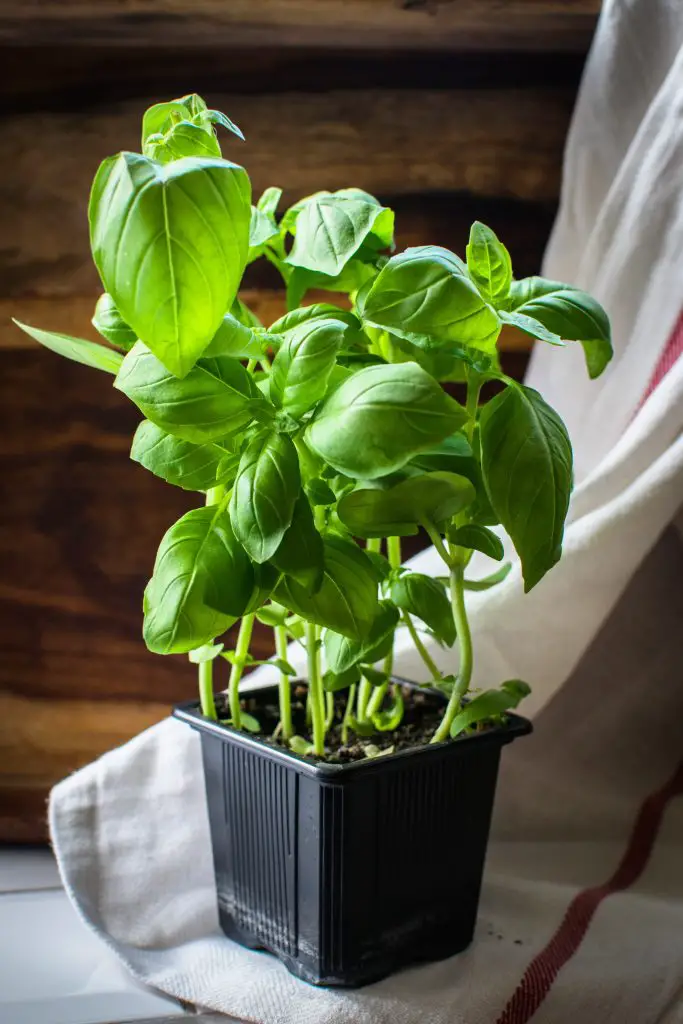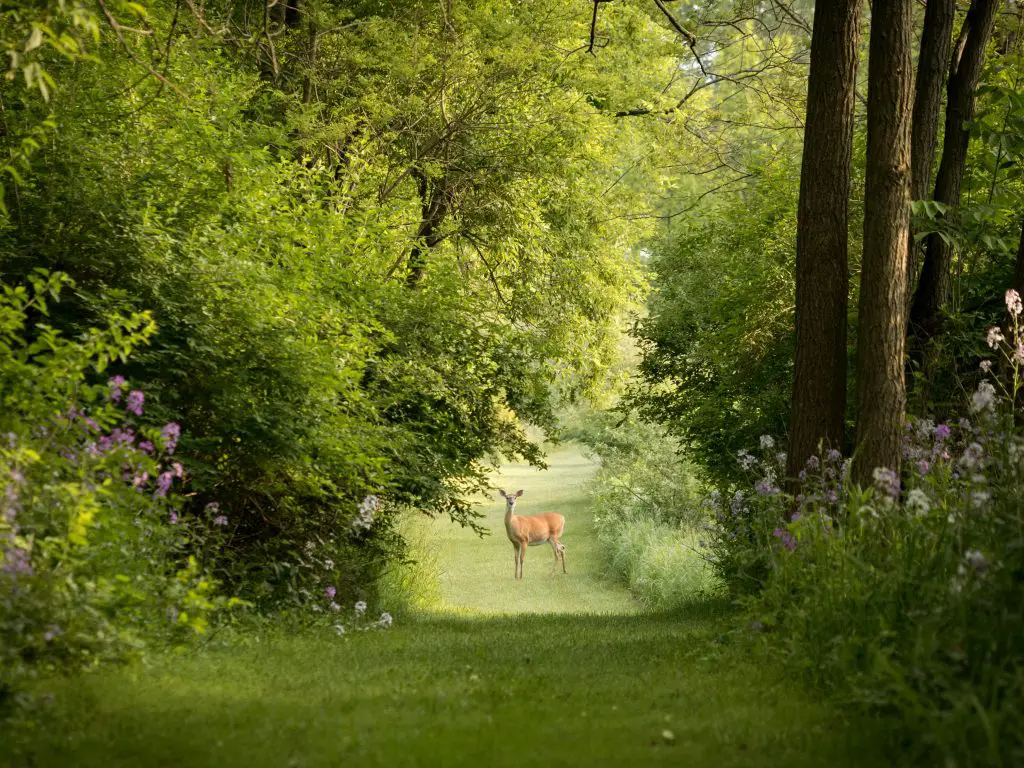Does Deer Eat Basil? Basil is an extremely popular culinary herb that is used in a wide range of Italian dishes to flavour pasta sauce along with many other dishes. Due to the popularity of this herb, many people grow them in the backyard alongside tomatoes which are its traditional companion plant. However, if you live in an area that has a large deer population can you grow basil or will they eat it?
Basil is generally considered to be relatively deer resistant according to the New Jersey Agricultural Experimentation Station website which classifies the plant has been seldom damaged by deer. This indicates that while basil is far from the deer’s favourite food it will eat it if there is nothing else available at the time.
When you compare the rating of this herb compared to other popular ones such as oregano or time you will find that it is slightly more favoured than these herbs by deer which means that while they will not eat the plant often they will not be particularly deterred by its smell. It is therefore generally not recommended as something you plant to specifically to repel deer from your property.
Additionally, I would suggest that while it is not the preferred food you will get the occasional nibble so you do need to protect the plants from deer at least to some degree.

How To Protect Basil Plants From Deer
The most effective way to protect basil plants, and your wider garden, from deer, is to exclude them entirely from the area. To do this successfully it requires you to erect a fence that is around 8 ft tall as deer are known to be excellent jumpers and can easily clear a 6 ft high fence if required. To read more about this click here.
However, for many gardeners building a fence is either too expensive or highly impractical on their property, so what are the alternatives?
There is a myriad of devices available for sale on Amazon which includes chemical repellents and mechanical repellents some of which are highly effective and some of which are not effective at all. So which one should you purchase and why?
Chemical Repellents For Deer
There is a range of chemical repellents available on the market however not all are equally effective. Academic research has indicated that the most effective formulations typically are ones that induce fear into the deer encouraging them to vacate the area.
This response is achieved by using ingredients such as coyote urine, blood, and purified egg which indicate to the deer that there is a predator nearby. In the case of petrified egg it produces sulphur compounds that mimic the smells produced by common predators which is why it is effective.
However academic studies have shown that these repellents become a lest effective over time as the deer becomes acclimatized to the smell of the repellents. Studies have shown that these repellents last approximately10 to 12 weeks before the deer begin to return and feed as normal. To read more about this click here.
To overcome this issue it is necessary to use a couple of different repellents throughout the year to avoid the local deer from becoming sensitized to the repellents. As a result of these effects we generally recommend using at least two different deer repellents.
The particular products we recommend are deer out and plantskydd which are both available on Amazon. The reason we select these particular varieties is because both of these products are design to induce fear in different ways. As a result of this they have a different scent and we’ll give the deer the impression that a new predator is lurking nearby. to to see latest prices for these products click on the links.

How To grow Basil
Basil is a relatively easy plant to grow and it can be grown from seeds or purchased as seedlings from either your local garden centre or you can even purchase it from your local supermarket as potted herbs. However, if you are planning to plant a potted herb from the supermarket there are a few extra things you need to do to the plant to ensure that it survives which are covered later in the article.
To grow basil from seed it is recommended that you plant it in early spring when the weather is starting to warm up. The seeds can be planted directly into the garden however I generally recommend that you use a seed tray because you have greater control over the environmental conditions and it is also easier to protect the seedlings from slugs and snails.
Planting Basil Seeds
To plant basil seeds start by filling up a seed tray with a good quality seed raising mix. Once the tray is full the seeds should be planted at a depth of approximately a quarter of an inch. If you are using a modular seed tray it is advisable to plant 6 to 8 seeds in each cell. The reason for this is that it will ensure that you have at least have some plants coming up in each cell.
If you need to purchase seeds we would highly recommend that you visit seeds now as they have a really wide range of vegetable seeds that are relatively cheap.
Once the seeds are planted they will typically take between 7 and 14 days to appear and then they will need to spend approximately 4 to 6 weeks in the seed trays before they can be planted out.
If you have sown multiple seeds into the cell and all of the plants have germinated it is advisable to thin the number of plants per cell down to 2 to 4 after a couple of weeks.
Planting Basil Seedlings Into The Garden
Once the seedlings are big enough to plant into the garden they should be spaced approximately 6 to 8 inches apart in a location that gets 6 to 8 hours of sunlight. In terms of soil conditions, basil plants prefer a rich moist and free-draining soil that contains plenty of nutrients. As such it is advisable to dig in a bag of compost before you put the plant into the ground.
Once the plant is in the ground it is also important to water the plants and then apply a layer of mulch approximately 2 to 4 inches. Additionally, it is highly recommended that you apply snail pellets around the plants as basil plants are highly susceptible to attack from slugs and snails.
From this point onwards the plants should be watered regularly, particularly in hot conditions. If you do this you should be harvesting basil within a few weeks of the plant going into the ground.
Growing Basil From Supermarket Herbs
In most supermarkets around the world you can purchase basil as a potted herb from the produce section. These plants are extremely cheap and attractive because it normally overflowing with fresh basil leaves.
However, they are designed to look good in the supermarket and will quickly fade even if you put the plant straight into the ground as soon as you get home. The reason for this is that the number of plants that are generally put into these pots is very high and there is generally not enough room for the plants to survive in the longer term.
To ensure that the plant survives it is highly recommended that you harvest what you need and then divide it into sections containing 2 to 3 plants before you place them into the ground. If you do this the plant will Survive.
In terms of looking after the plants on an ongoing basis you simply need to follow the directions in the previous section. If you want to see how to do this I would highly recommend that you watch the video below by Charles Dowding as he provides an excellent example of what happens to the plant when you treat it in three different ways.
I hope you found this blog useful and have great success with your basil plants. If you have questions or comments please leave them in the section below.
Relevant Articles
Does Deer Repellent Really Work? (All The Answers Based On Academic Research)
How High Can A Deer Jump? (And What Type Of Fence Do I Need To Build To Keep Them Out)
Is Lavender Deer Resistant? Can You Use Them To Protect Your Garden
Are Raspberries Deer Resistant? (And How To Protect Them)

